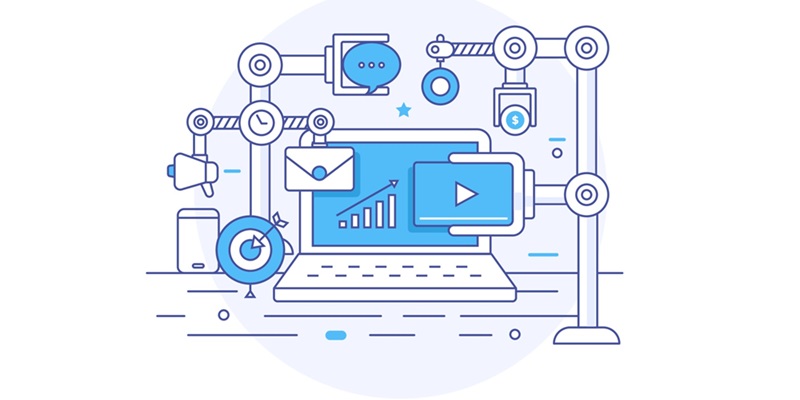In today’s fast-paced world, marketing automation has emerged as a game-changer for businesses looking to effectively engage their target audiences. By harnessing the power of technology, marketing teams can tailor messages to individuals with unprecedented precision. This article explores the various ways in which marketing automation enhances personalization, streamlines processes, and maximizes efficiency. Let’s delve into the intricacies of this dynamic marketing approach.
Streamlining Processes and Enhancing Efficiency
Marketing automation empowers teams by automating repetitive tasks and workflows, freeing up time for more strategic initiatives. With automated processes in place, marketers can efficiently handle tasks such as lead scoring and nurturing, email campaigns, and social media management. By eliminating manual efforts, businesses can focus on delivering personalized experiences that resonate with their target audiences.
The Importance of Customer Journey Mapping
A customer journey map is a vital tool that helps marketers understand the different touchpoints customers interact with throughout their buying journey. By charting out these touchpoints, pain points, and opportunities for engagement, marketers gain a comprehensive view of the customer’s experience. This insight enables them to create tailored messages that directly address customer needs and preferences at each stage of the journey.
The Role of Engaging Content
The heart of successful marketing lies in delivering high-quality and engaging content. Marketing automation empowers businesses to seamlessly distribute relevant content to the right audience at the right time. By leveraging automation tools, marketers can segment their audience and map out communications that align with specific buyer personas. This approach ensures that content is personalized, offering value and driving customer engagement.
Lead Management Strategy
A well-defined lead management strategy is crucial for nurturing leads appropriately and efficiently. Marketing automation streamlines lead nurturing by automating processes such as lead scoring, lead nurturing campaigns, and follow-ups. With automation tools, businesses can better track and analyze lead behavior, enabling customer-facing employees to tailor their interactions and provide the right information at the right time.
Tailoring Marketing Automation to Buyer Personas
To truly amplify the benefits of marketing automation, personalized strategies must align with specific buyer personas. By understanding the unique characteristics, needs, and pain points of different buyer segments, businesses can tailor automation workflows, content, and messaging accordingly. This ensures that each customer receives a highly customized and relevant experience that resonates with their specific interests.
Behavior-Based Triggers for Personalized Interactions
Behavior-based triggers are a powerful feature of marketing automation that enable real-time, personalized interactions based on customer actions and interests. By monitoring customer behavior, marketers can send targeted communications, such as abandoned cart reminders, personalized recommendations, or loyalty reward programs. These interactions significantly enhance customer experience and boost engagement by providing a seamless and contextual experience.
Segmentation for Personalized Communications
Segmentation is a vital aspect of marketing automation that allows marketers to divide their audience into meaningful groups based on various factors such as demographics, preferences, or purchase history. By segmenting the audience, businesses can create highly personalized communications that resonate with individual needs and interests. This approach strengthens customer relationships and fosters a sense of connection and understanding.
The Importance of A/B Testing
To continuously improve marketing automation strategies, regular A/B testing is crucial. By testing different elements of communications such as subject lines, call-to-action buttons, or email templates, marketers can optimize their approach based on real-time data and feedback. A/B testing helps businesses fine-tune their automation efforts and maximize their effectiveness in engaging customers and driving desired actions.
Nurturing Customer Relationships Beyond the Purchase
Marketing automation extends beyond the purchase stage, enabling businesses to nurture long-term customer relationships. By delivering personalized post-purchase communications, businesses can foster loyalty, encourage customer advocacy, and drive repeat purchases. Through automated processes, businesses can deliver relevant content, recommend complementary products, and provide exceptional customer service, resulting in customer satisfaction and brand loyalty.
Marketing automation has revolutionized the way businesses engage with customers, delivering personalized experiences while streamlining processes. By leveraging marketing automation tools and strategies, marketers can tailor messages, engage with specific buyer personas, and maximize efficiency. With behavior-based triggers, segmentation, and A/B testing, businesses can fine-tune their automation efforts, driving customer engagement and loyalty. Embracing marketing automation enables businesses to not only meet but exceed customer expectations, ultimately leading to long-term success in today’s competitive landscape.

